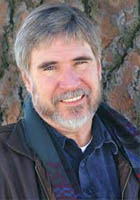Christopher Howell
Christopher Howell Poems
When Keats, at last beyond the curtain
of love's distraction, lay dying in his room
on the Piazza di Spagna, the melody of the Bernini
Fountain "filling him like flowers,"
...
Christopher Howell Biography
Christopher Howell (born August 29, 1945) is an American poet, editor, and educator. He has published nine books of poetry. Born in Portland, Oregon, Howell served as a journalist for the U.S. Navy during the Vietnam War. He earned a B.S. from Oregon State University in 1968, an M.A. from Portland State University in 1971, and an MFA from the MFA Program for Poets & Writers at the University of Massachusetts Amherst in 1973. He also attended Pacific Lutheran University in Tacoma, Washington. Starting 1972, Howell served as the director and principal editor for Lynx House Press which awards the Blue Lynx Prize for Poetry. Lynx House was founded in Amherst, Massachusetts, USA, in the 1970s by Christopher Howell with David Lyon, and Helena Minton, with the press moving to its present location in Spokane, Washington in 1996 where in 2005 Lynx House became an impress of Eastern Washington University Press but in 2010 became an independent and non-profit literary publisher. The press, in addition to hosting the Blue Lynx Prize, also publishes other books of poetry. Howell is also editor of Willow Springs Books, director of the Eastern Washington University Press, and on the faculty of the Master of Fine Arts Program in Creative Writing at Eastern Washington University.[citation needed] His daughter, Emma Howell, was an aspiring poet and student at Oberlin College who died at age 20 in June 2001. Her family published her poems posthumously in a volume titled Slim Night of Recognition.)
The Best Poem Of Christopher Howell
Keats
When Keats, at last beyond the curtain
of love's distraction, lay dying in his room
on the Piazza di Spagna, the melody of the Bernini
Fountain "filling him like flowers,"
he held his breath like a coin, looked out
into the moonlight and thought he saw snow.
He did not suppose it was fever or the body's
weakness turning the mind. He thought, "England!"
and there he was, secretly, for the rest
of his improvidently short life: up to his neck
in sleigh bells and the impossibly English cries
of street vendors, perfect
and affectionate as his soul.
For days the snow and statuary sang him so far
beyond regret that if now you walk rancorless
and alone there, in the piazza, the white shadow
of his last words to Severn, "Don't be frightened,"
may enter you.

A profound poem on the impact of inequality, poverty, horrors of war, fear etc on childhood! Late 40's and early 50's were hard times for children all over the world, due to the extreme impact of war. Germans and Japanese symbolised this horror. The poem depicts it horrible Marsh Wheeling crooks, dark forms rose near us like submarines listening, mystified Germans, perhaps, trapped there since the war and wondering if they should kill us or simply steal our catfish and cigars. They are dreaded as crooks who would rob the child of his coveted possessions of catfish and cigars. Or simply kill us! I remember that even in my childhood, that is early sixties, these words were dreaded. German were represented by the battleship Emden (EmaNdan, in colloquial Malayalam) that visited of little port Cochin/Kochi during the war and spread horror. Japanese were dreaded for they 'would steal girls and women tpeat them'. Uttering these two words was enough for mothers to make their children obey without any demur.